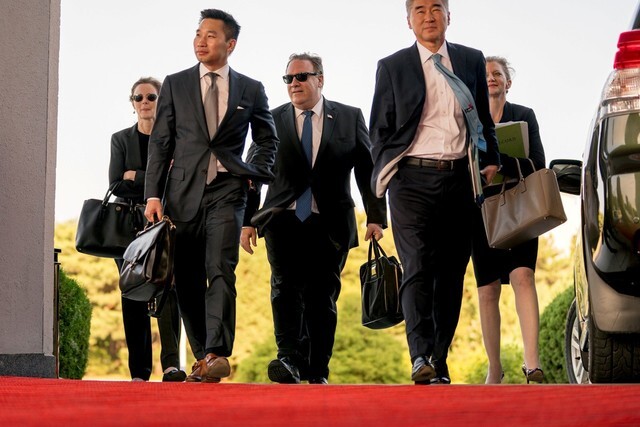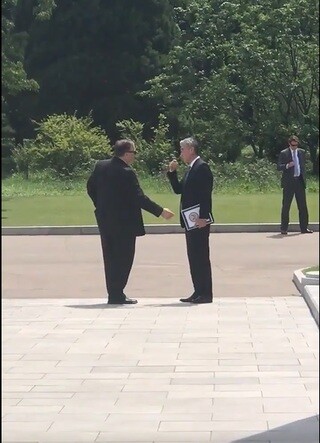hankyoreh
Links to other country sites 다른 나라 사이트 링크
North Korea’s statement boils down to disappointment and concern

North Korea’s reaction to the results of the high-level talks aimed at implementing the June 12 joint statement between US Secretary of State Mike Pompeo and Korean Workers’ Party Vice Chairman Kim Yong-chol that were held at the Paekhwawon State Guesthouse in Pyongyang between July 6 and 7 boils down to two points. The first is disappointment and concern. The second is a complaint and a warning that the trust and feelings that were built during the summit between North Korean leader Kim Jong-un and US President Donald Trump and the statement they released on June 12 must not be damaged “by the old-fashioned methods of working-level experts.”
First, the disappointment and concern. In a Foreign Ministry spokesperson’s statement shortly after Pompeo left Pyongyang, North Korea declared, “Our hopes and expectations were so naive as to be gullible.” It also described the outcome of the talks as “apprehensive.” Unlike his first two visits to the North, Pompeo did not meet with Kim Jong-un, and no “new agreement” was reached. That fact, and the references to the US’s “unilateral and gangster-like denuclearization demands” in the “statement,” provides a clear indication of Pyongyang’s disappointment.
There was some progress. Talks on the return of remains from US POW/MIA in the Korean War were scheduled to take place in Panmunjeom on July 12, and Pompeo announced plans to hold working-level talks shortly on the issue of shutting down the North’s missile engine testing site. It amounts to a token of good will from Pyongyang, indicating its commitment to following through on fast agreements.
But once it became apparent Pompeo had arrived in North Korea “empty-handed,” Pyongyang offered no gifts of its own. It was the bare minimum to avoid the talks being described as breaking down – a troubling situation for those who looked forward to Pompeo’s third visit injecting new momentum in the two sides’ implementation of their June 12 joint statement.
At the “talks,” North Korea released a statement claiming to have proposed “constructive approaches to the balanced implementation of all terms in the Joint Statement”: engaging in various forms of exchange to improve North Korea-US relations (“establishing new US-DPRK relations” according to item 1 in the Joint Statement), declaring an end to the Korean War for the 65th anniversary of the armistice agreement (item 2 on “efforts to build a lasting and stable peace regime”), halting ICBM production and dismantling the engine test site as physical proof (item 3 on “working toward complete denuclearization”), and quickly beginning working-level talks toward the excavation of US soldier remains (item 4 on “recovering and repatriating POW/MIA remains.”

But the statement blasted the US for pushing “unilateral, gangster-like denuclearization demands, just calling for CVID, declaration and verification, all of which run contrary to the spirit of the Singapore summit meeting and talks.” It also accused Washington of taking “the position that it would even backtrack on the issue it had agreed on to end the status of war under certain conditions and excuses.”
Pyongyang’s claim is that while it presented priority tasks for all four of the items in the joint statement, Washington’s focus was solely on applying pressure for “unilateral denuclearization.”
“But, if the US, being captivated in a fidget, tries to force upon us the old ways claimed by the previous administrations, this will get us nowhere,” the statement added – sending the clearly message that Pyongyang has no intention of agreeing to unilateral demands for CVID, declaration and verification.
“The quickest shortcut to achieving denuclearization of the Korean Peninsula,” the statement stressed, would be an “utterly new approach” of “proceeding step-by-step in first resolving matters that can be addressed through a principle of simultaneous action based on the establishment of trust.”
At the same time, North Korea indirectly stressed that it does not intend to spoil the moment. For one thing, the statement did not make any mention of the lifting of sanctions. The omission is a notable development, suggesting that Pyongyang does not intend to one-sidedly focus on its own “areas of interest.” The statement was also published only by the Korean Central News Agency, which is intended for overseas readers, and was not included in the Rodong Sinmun newspaper for domestic consumption.
Point of not targeting Trump
Additionally, the statement stressed, “We still cherish our good faith in President Trump,” taking aim instead at the “old-fashioned methods of working-level experts.” The message reads as both a moderation of Pyongyang’s message and a means of drawing distinctions by not including Trump as a target for criticism.
At the same time, the statement also sent messages of warning and complaint, stressing that there was “no guarantee anywhere that we will each have to find other options that might lead to a tragic income once adverse winds begin to below” if the US “succumbs to nerves and imposes outdated methods” and if an “objective environment suited to achievement of denuclearization separately from our own commitments is not formed.” In short, it reads as a demand and plea for the US to honor the spirit of the June 12 Joint Statement – and its message that “mutual confidence building can promote the denuclearization of the Korean Peninsula” – by considering Pyongyang’s position as it works to resolve issues.
By Lee Je-hun, senior staff writer
Please direct comments or questions to [english@hani.co.kr]

Editorial・opinion
![[Column] Has Korea, too, crossed the Rubicon on China? [Column] Has Korea, too, crossed the Rubicon on China?](https://flexible.img.hani.co.kr/flexible/normal/500/300/imgdb/original/2024/0419/9317135153409185.jpg) [Column] Has Korea, too, crossed the Rubicon on China?
[Column] Has Korea, too, crossed the Rubicon on China?![[Correspondent’s column] In Japan’s alliance with US, echoes of its past alliances with UK [Correspondent’s column] In Japan’s alliance with US, echoes of its past alliances with UK](https://flexible.img.hani.co.kr/flexible/normal/500/300/imgdb/original/2024/0419/2317135166563519.jpg) [Correspondent’s column] In Japan’s alliance with US, echoes of its past alliances with UK
[Correspondent’s column] In Japan’s alliance with US, echoes of its past alliances with UK- [Editorial] Does Yoon think the Korean public is wrong?
- [Editorial] As it bolsters its alliance with US, Japan must be accountable for past
- [Guest essay] Amending the Constitution is Yoon’s key to leaving office in public’s good graces
- [Editorial] 10 years on, lessons of Sewol tragedy must never be forgotten
- [Column] A death blow to Korea’s prosecutor politics
- [Correspondent’s column] The US and the end of Japanese pacifism
- [Guest essay] How Korea turned its trainee doctors into monsters
- [Guest essay] As someone who helped forge Seoul-Moscow ties, their status today troubles me
Most viewed articles
- 1[Column] The clock is ticking for Korea’s first lady
- 2Hong Se-hwa, voice for tolerance whose memoir of exile touched a chord, dies at 76
- 3After 2 months of delayed, denied medical care, Koreans worry worst may be yet to come
- 4[Column] Has Korea, too, crossed the Rubicon on China?
- 5Samsung barricades office as unionized workers strike for better conditions
- 6US overtakes China as Korea’s top export market, prompting trade sanction jitters
- 7All eyes on Xiaomi after it pulls off EV that Apple couldn’t
- 8[Guest essay] How Korea turned its trainee doctors into monsters
- 9[Editorial] As it bolsters its alliance with US, Japan must be accountable for past
- 10[Correspondent’s column] In Japan’s alliance with US, echoes of its past alliances with UK